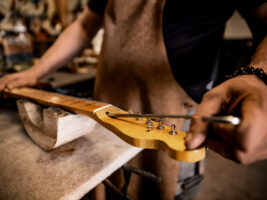
Cause & Effects: Why it’s essential for guitarists to have DIY skills
In most hobbies, there are the outliers who adopt a more “do it yourself” approach – those who learn in a non-traditional manner and hone their craft by making mistakes over and again until either a gem is created, or their hairline recedes.
READ MORE: Cause & Effects: Why the DigiTech Whammy is the most iconic pedal of the modern era
Like many others I have adopted a policy of learning from YouTube for other hobbies I have an interest in. I’ve watched countless woodworking videos, iron smithing, knife sharpening and Photography tips and tricks. All of which have enabled me to be better at those skills than ordinarily I have any right to be, I am far from a professional in any one of these endeavours, but the extra ability is welcome. With regards to guitar pedals I believe having a basic level of DIY skill is vital for guitarists, and I’ll explain why.
Image: Getty Images
The DIY deficit
When we talk about DIY with regards to pedals and pedalboards, people assume it only means building pedals from scratch. The DIY mindset is a sliding scale that encompasses everything from using a multimeter through to building your own complex pedals and amplifiers. A lot of people I speak to though are uncomfortable with anything above changing a battery for fear of damaging the items in question.
The reality is that if you have the skill and intelligence to learn an instrument, then basic troubleshooting is well within your ability. The trick is getting comfortable with things.
Not only is this something you should be comfortable with but in truth having some DIY skills will help you become a better guitarist all-round as the amount of “downtime” due to faults will be reduced. In my opinion, these are the three must-have (complimentary) skills you should acquire immediately.
Using a multimeter
Understanding voltage and current requirements
Basic troubleshooting
You can pick up a multimeter cheap on Amazon from as little as £10. For that money you get the ability to measure signal continuity, AC voltage, DC voltage, resistance, and check if a diode is working. For myself I find the most used settings are using it as a continuity tester for checking your cables are working and not shorting, as this is vital to troubleshooting issues in your rig. There are specific cable testers out there, but a multimeter is much better value and much more versatile.
Understanding each of your pedals’ voltages, polarity and current draw is vital to ensuring you don’t inadvertently destroy your pedals or create a pedalboard that doesn’t have enough current to work properly. Getting this wrong can at best make things fail intermittently or at worst over-stress your power supply so that it fails prematurely. Again, a multimeter can help by measuring the voltage output by your supply and confirming to you its polarity. For current draw, manufacturers will provide this information. Most manufacturers won’t cover damage to a pedal through negligence or incorrectly powering a pedal. So, this skill alone will absolutely save you money.
For basic troubleshooting it’s good to adopt a logical approach. If a problem occurs once you have introduced something new, remove it and associated cables to see if the problem persists. Often you must strip your signal chain down to its simplest form (guitar-cable-amp) to have a starting point that you know works. From this point introduce elements until you find the fault. Thereafter work to resolve fault. Often the fault will be mechanical in nature (cable connection failure) and if so the multimeter skills you have learnt will aid you confirm the fault.
Image: Getty Images
Taking DIY further
If your newfound mastery of your rig leaves you craving even more control, then learning to solder correctly is the natural next skill to learn. This skill (easily learnt by following awesome content creators on YouTube) will allow you to fix faults found, solve issues with broken cables, and even allow you to replace pickups in your guitar.
Then what?
Well for me, the thing that drove on my DIY upskilling was a desire to build my own patch cables and guitar cables to the highest standard I could. Thereafter I attempted to build some of the classic circuits using my newly acquired soldering skills. With a modicum of success, I adopted an approach of trying to build the circuits to an almost forensic level of detail and then the obsession was fully formed and gathering momentum.
Clearly, I took the DIY approach to how I wanted to develop my rig to the extreme level, but somewhere within this sliding scale is a comfortable place for you. If you are still unsure then if I can recommend anything, learn the first three skills I recommend above. It’ll give you a freedom to understand your rig and fix simple issues both when practising or when under the pressure of playing live. The rest can follow (or not) as you gain confidence.
The post Cause & Effects: Why it’s essential for guitarists to have DIY skills appeared first on Guitar.com | All Things Guitar.
Source: www.guitar-bass.net












